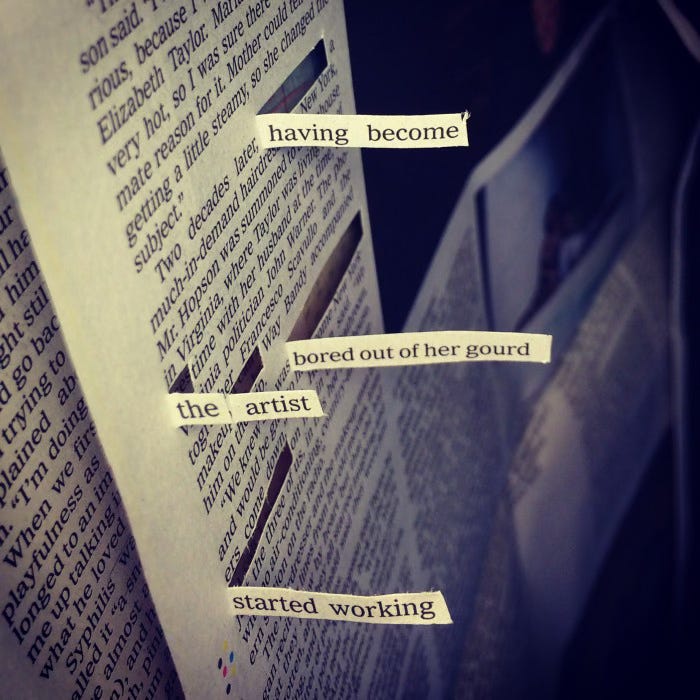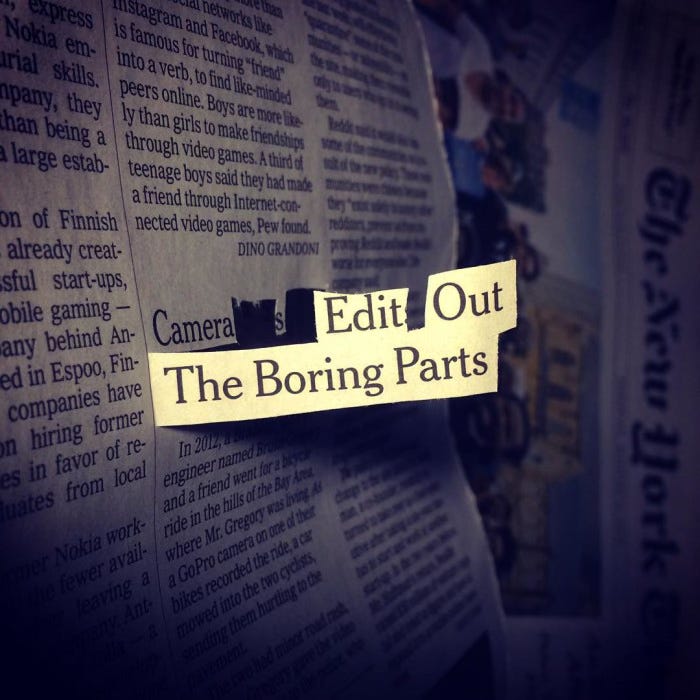3 tricks for self-editing
How to read your work like somebody else wrote it
Hey y’all,
My trouble with self-editing is that I’m too good at it. I self-edit before I even write! I’m really good at talking myself out of writing. I’ve talked myself out of many more books than I’ve actually written. In my head, there’s too much editing going on too soon.
Even when I sit down to actually write, I am what Kurt Vonnegut in Timequake called a “basher”:
Tellers of stories with ink on paper… have been either swoopers or bashers. Swoopers write a story quickly, higgledy-piggledy, crinkum-crankum, any which way. Then they go over it again painstakingly, fixing everything that is just plain awful or doesn’t work. Bashers go one sentence at a time, getting it exactly right before they go on to the next one.
I would love to be a swooper and just blurt out a first draft, quickly, knowing I will fix it later. But I just can’t. I like to sit down and have one clean go at it, sentence by sentence.
I recognized a bit of myself in this passage from one of Lucy Sante’s essays on writing:
I’m far too lazy to ever attempt to write successive drafts of anything. My first drafts are also my final drafts, with a lot of fiddling in between. I view sentences as stairsteps. In order to build the next step, you first have to make sure that you can bounce on the one below it…
Sante is, obviously, a basher. So is Joy Williams:
I write slowly, put a lot of pressure on the line and page before I move on. Committing to a word then realizing it’s not the right one and seeking another, that’s revision I suppose. It’s drafts I don’t believe in. I’m averse to entertaining the thought that what I’m working on is a first draft, which implies the necessity of a second, even a third.
I believe in “shitty first drafts” in theory… just not in practice.

“You can’t write differently, even if you want to,” says Adam Phillips. “You just have to be able to notice when you are boring yourself.”
This is excellent advice for self-editing: notice when you’re boring yourself, and either cut the boring parts, or skip writing them altogether.
My friend Maud Newton published a piece called “Don’t Write the Tedious Thing” when she was working on her book Ancestor Trouble. She said at certain points she’d become resentful of the book and think, “Ugh, now I have to write this boring part.” But then she had a realization:
This is my book! There are no rules! I can write it however I want! Also, I would think, if I’m bored by something that I believe I need to write, the reader undoubtedly will be too, if not because the subject is inherently boring, then because I myself find it so unbearably tedious to imagine discussing it for five pages. Often as not, I would remember some aspect of the subject that deeply interested me, something a little outside the way it’s usually perceived or written about. Then I would meditate on that, and soon I would be scribbling notes from an increasingly excited place until I found a way forward. A form of beginner’s mind.
I thought about this so much while writing my next book! Whenever I’d find myself getting bored by something… I’d just cut it! If I didn’t want to write a certain section I’d laid out in the proposal… I didn’t write it! It was beautiful.
Did I mention I finished a draft of my next book? Buried the lede there.
Once I finish a draft, I have a series of tricks that help me self-edit before I hand it over to anyone else. I outlined them in this short video:
In general, what I’m trying to do with these tricks is make the manuscript strange enough that I can see it for what it is.
Let’s take each trick one by one:
1. Time is the best editor.
Keep reading with a 7-day free trial
Subscribe to Austin Kleon to keep reading this post and get 7 days of free access to the full post archives.



